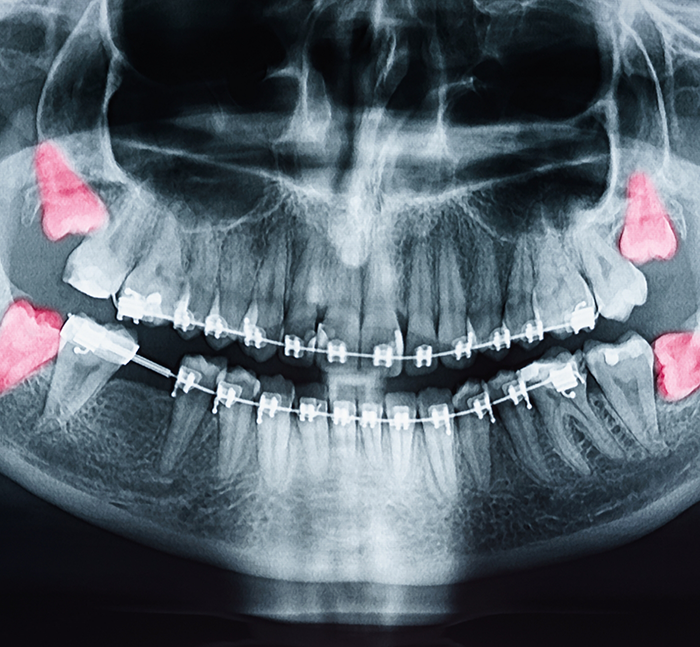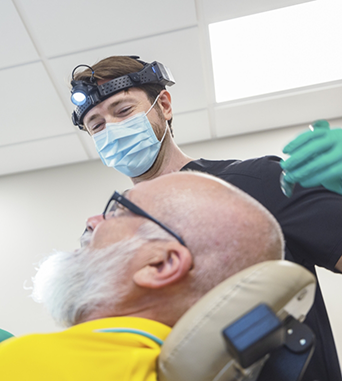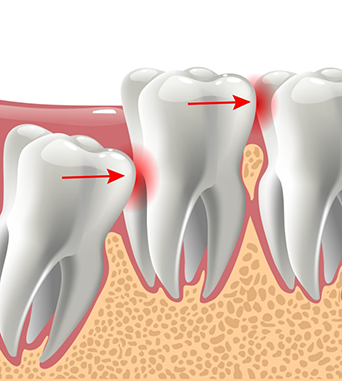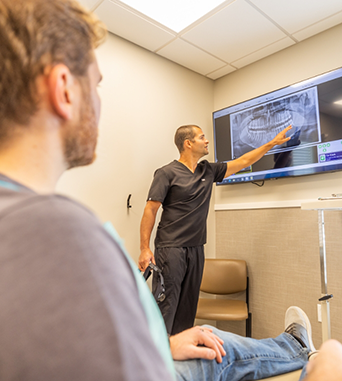Wisdom Teeth Extractions Lancaster
Relief From Wisdom Tooth Pain

Around the age of 18, the average adult has 32 teeth. Unfortunately, for many people, the upper and lower jaws are not large enough to allow for passive eruption of all these teeth in the mouth. The last teeth to develop are the third molars (wisdom teeth). When they align properly and are easily cleansable, they may not need to be removed. Oftentimes, these teeth develop at abnormal angles, only partially erupt through the gums, cause crowding or damage to neighboring teeth, or develop pathology later in life.
Why Choose Conestoga Oral Surgery for Wisdom Teeth Extractions?
- Happy to See All Ages of Patients for Wisdom Teeth Consultations and Extractions
- Hundreds of Thousands of Wisdom Teeth Successfully Removed Since 1985
- Doctor on Call 24/7 for Any Post Operative Emergency Needs
Both medical and dental research provide clear evidence of the benefits of early wisdom teeth removal. In fact, patients older than 25 years of age have a much higher risk of developing periodontal disease or cavities at the third molar sites. These diseases cause deep pocketing at the site where bacteria thrive. This is not only bad for your oral health, but over time, can lead to increased levels of systemic inflammation which contributes to serious medical conditions such as heart disease, diabetes, and kidney disease.
Wisdom tooth extractions are a common rite of passage for many teenagers and young adults. To start these key moments of life on the right foot, our team at Conestoga Oral Surgery offers wisdom tooth extractions at our oral surgery offices in Lancaster, Lititz, and Hershey. Call our office today to schedule a consultation and learn whether your third molars need to be extracted.
Do I Need My Wisdom Teeth Removed?

Our doctors can help you determine the need for removal by obtaining diagnostic images using advanced technology, like our panorex or cone beam CT scanner, and completing a thorough clinical examination. During your consultation, risks and benefits will be discussed to assist you in making a well-informed decision. We want you to enjoy a healthy and happy smile for as long as possible, and in some cases, to make that happen, impacted or malposed wisdom teeth should be removed.
It’s estimated that over 50% of Americans will have at least one impacted wisdom tooth. This issue often necessitates removal because when left in place, the tooth can lead to a higher risk of infections, damage and decay to surrounding teeth, pathology development, and orthodontic issues. Our oral surgeons have removed hundreds of thousands of wisdom teeth since we first opened in 1985, so rest assured that you will receive expert care alongside our outstanding and comfortable service.
The Wisdom Tooth Removal Process

Due to the variability of tooth positions, wisdom teeth are categorized in various ways (erupted, buried under soft tissue, completely impacted, etc.). This categorization often results in differing levels of recovery, such as swelling, pain, and bleeding. The surgical process will be discussed in greater detail at your consultation. In most cases, the removal of wisdom teeth is performed under local anesthesia and general anesthesia. This increases patient cooperation and decreases overall anxiety during the procedure. You will recover in our office until you are ready to be taken home by your escort to begin the healing process.
After the Extraction of Wisdom Teeth

Patients will be provided with extra gauze and given both written and verbal post-operative instructions for additional guidance as they leave the office. These instructions can also be downloaded in PDF format from our website for your convenience. Should you lose them, here are some general recommendations to help you make a fast recovery:
- Change out the gauze pad over your extraction site every 30 minutes and bite with firm pressure until the bleeding has dissipated or slowed to a manageable ooze.
- Reduce swelling and pain by placing ice packs on your cheek for 20 minutes on and 20 minutes off.
- Avoid rinsing for the first 24 - 48 hours, then transition to lukewarm saltwater rinses to clear the mouth of food debris. Sometimes your surgeon will prescribe a medicated mouthrinse that should be used in lieu of the saltwater rinses.
- Eat a soft, non-chew diet during the first week as your mouth is healing.
- Keep up with brushing and flossing during the healing period to prevent increased bacteria in the mouth.
Wisdom Tooth Extractions FAQs
Why Do We Have Wisdom Teeth?
For modern humans, wisdom teeth are regarded as vestigial, but that was not the case for our ancient ancestors. They subsisted on a rough diet that included things like nuts, roots, and raw meats. With few to no food processing techniques to make food easier to consume, their teeth had a tough job! By the time they reached early adulthood, a third set of molars (the wisdom teeth) could prove to be an invaluable asset.
Even though we eat a much gentler diet today, the genetic disposition for wisdom teeth to develop remains. Unfortunately, it is common for the jaws of modern humans to be too small to accommodate a third set of molars.
Does Everyone Have Wisdom Teeth?
Most people develop four wisdom teeth, one in each quadrant of the mouth. However, some only develop a few, and rarely, you will come across a patient who never developed any wisdom teeth!
Keep in mind that even if you cannot see your wisdom teeth, that does not mean they aren’t present and can’t create future problems. During routine check-ups with your general dentist, they will likely take X-rays to determine if you have wisdom teeth beneath your gumline and whether they might pose a threat to your oral health. A consultation with an oral surgeon is often recommended.
How Should I Prepare for My Wisdom Tooth Extraction?
To be well-prepared for your wisdom tooth extraction with our team, you should:
- Ask questions. Our team wants you to feel well-informed, so do not hesitate to ask any questions about the procedure or what you can expect during your recovery.
- Prepare your body. We may ask you to abstain from smoking, temporarily stop taking certain medications, or fast for several hours before your procedure.
- Prepare for your recovery. You will need to arrange for a trustworthy adult to drive you home from your appointment. You should also stock up on soft foods that are easy to prepare. Things like applesauce, yogurt, and meal replacement shakes can be good choices.
How Do You Make Wisdom Teeth Pain Go Away?
The only way to permanently stop wisdom teeth pain is to get them removed. In the meantime, though, you can reduce discomfort by taking some simple steps:
- Apply a warm compress to the outside of your cheek for 20 minutes at a time.
- Take over-the-counter pain medications in appropriate doses.
- Regularly rinse your mouth with warm salt water or, if prescribed, an antibacterial rinse.
- Avoid crunchy or hard foods that might irritate sensitive areas of your mouth.
Should Wisdom Teeth Be Removed If They Do Not Hurt?
Some patients have enough room in their mouth for the wisdom teeth to erupt like the other teeth in your mouth. After obtaining X-rays and a performing a thorough clinical examination, your general dentist or oral surgeon might determine that your wisdom teeth have a high potential for causing future pain and complications. In such cases, getting them removed is a smart preventive measure.
